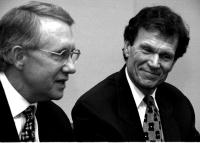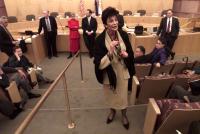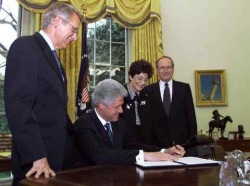 |
|
LEGISLATION ARTICLE ARCHIVE Spring 2002: 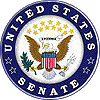 Yucca Mountain's fate currently hangs in the balance as Congress waits for the Senate to vote on S.J. Res. 34, a resolution that would finalize the site's designation as the burial ground for 77,000 tons of spent nuclear fuel and government radioactive waste. The House has already passed H.J. Res. 87, approving Yucca Mountain with a margin of 306-117 on April 25, 2002. Yucca Mountain's fate currently hangs in the balance as Congress waits for the Senate to vote on S.J. Res. 34, a resolution that would finalize the site's designation as the burial ground for 77,000 tons of spent nuclear fuel and government radioactive waste. The House has already passed H.J. Res. 87, approving Yucca Mountain with a margin of 306-117 on April 25, 2002.The issue came to Congress in April 2002 after Nevada Governor Kenny Guinn vetoed President Bush's designation of Yucca Mountain as the nation's High Level Waste (HLW) repository. Bush, acting on the recommendation of Energy Secretary Spencer Abraham, approved the site on February 15. The House, after holding two hearings, quickly passed the H.J. Res. 87 with a large majority. The Senate has since held three Yucca hearings in mid to late May, but has yet to vote on S.J. Res. 34. However, the Senate only has until late July to vote on the issue. The 1982 Nuclear Waste Policy Act mandates that Congress only has 90 days to overturn the Governor's veto once it has been made; after that, the veto will stand – and Yucca Mountain will not become a nuclear waste repository. 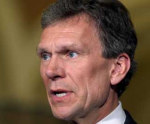 Nevada Senators Harry Reid and John Ensign are trying to use this law to their advantage. Because they do not expect to have enough support to defeat the proposed Yucca HLW repository in the Senate, they hope to prevent the issue from ever coming to a vote. Reid, the second most powerful democrat in the Senate, has the support of Senate Majority Leader Tom Daschle, D-SD. Daschle has promised not to bring up the Yucca Mountain Resolution for debate on the Senate floor. Nevada Senators Harry Reid and John Ensign are trying to use this law to their advantage. Because they do not expect to have enough support to defeat the proposed Yucca HLW repository in the Senate, they hope to prevent the issue from ever coming to a vote. Reid, the second most powerful democrat in the Senate, has the support of Senate Majority Leader Tom Daschle, D-SD. Daschle has promised not to bring up the Yucca Mountain Resolution for debate on the Senate floor.
Traditionally, Senate custom permits only the majority leader to call up a bill for consideration. But it is expected that a Republican Senator will move to open debate on Yucca despite Daschle's refusal to do so. If and when this happens, Reid and Ensign will contest the move, arguing that the Senate would be setting a bad precedent if they defied the majority leader. The Senators will then have to vote on whether to continue consideration of the bill. Such a procedural vote is predicted to be close. But if Reid and Ensign win, it will allow Daschle to run out the clock until the late July deadline passes, killing the Yucca repository. Consequently, the fight over Yucca in the Senate is probably going to focus more on Senate procedures and customs than it is on the merits or problems of the proposed repository. "This is raw politics at its best," said Sen. Larry Craig, R-Idaho, who has emerged as a lead senator pushing the Yucca Mountain resolution. The irony of Yucca's political showdown is not lost on Senator Ensign.  He calls Congress' 1987 decision to study only Yucca Mountain for the HLW repository a "blatantly political" move, since sparsely-populated Nevada has little political clout to protest a federally-designated nuclear waste dump. Now he and Reid hope to defeat the measure with an equally political maneuver. He calls Congress' 1987 decision to study only Yucca Mountain for the HLW repository a "blatantly political" move, since sparsely-populated Nevada has little political clout to protest a federally-designated nuclear waste dump. Now he and Reid hope to defeat the measure with an equally political maneuver.
– written with the aid of a Las Vegas Review Journal article, "Senate Republicans Call on Daschle to open Yucca Debate," 6/19/02 |
||||
Summer/Fall 2001:
|
